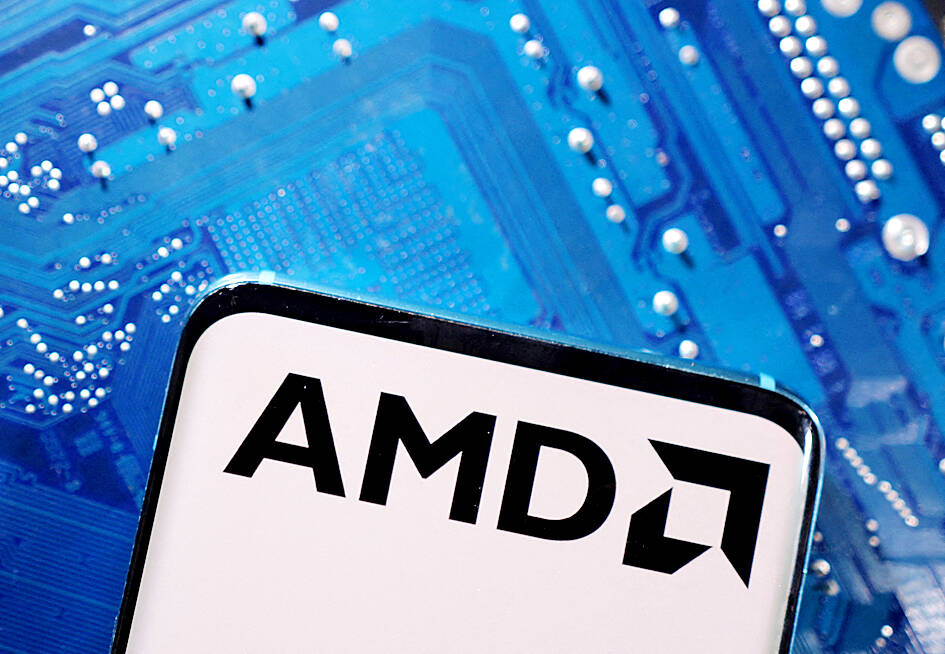Advanced Micro Devices Inc (AMD), Nvidia Corp’s closest rival in artificial intelligence (AI) processors, said that US restrictions on sales to China would cost US$1.5 billion in revenue this year, a warning that clouded an otherwise upbeat outlook.
The guidance stems from an export restriction imposed last month that targeted AMD’s MI308 chips, the company said during an earnings call on Tuesday.
Data center revenue would decline in the current period, hurt by a US$700 million reduction in sales of that product, AMD said.

Photo: REUTERS
Chief executive officer Lisa Su (蘇姿丰) remains bullish about overall demand for AI infrastructure. She also reiterated her projection that new chips debuting soon would help boost sales in the second half of the year. However, she is facing investor concerns about trade restrictions and tariffs, as well as the challenges of competing with Nvidia in the AI chip market.
“We’re excited about the overall AI business — I think we continue to see strength there,” Su said. “I know there are some uncertainties as it relates to tariffs and other things, but this is one of those areas where from an infrastructure standpoint, there continues to be investment in AI infrastructure. And so with that, we would expect strong growth into the second half of the year.”
Last month, AMD said it expected to record an expense of about US$800 million because of the new export rules.
Second-quarter sales are forecast to be about US$7.4 billion, the company said.
That compares with an average analyst estimate of US$7.23 billion.
AMD’s first-quarter sales rose 36 percent year-on-year to US$7.4 billion, topping the US$7.12 billion estimate. Profit was US$0.96 a share, minus certain items.
Revenue in the data center division was US$3.7 billion in the period, a gain of 57 percent from the same period a year earlier, while personal computer-
related sales climbed 28 percent to US$2.9 billion.
AMD is the second-biggest provider of graphics chips, which form the basis for the AI accelerators that run in data centers.
Nvidia chief executive officer Jensen Huang (黃仁勳) on Tuesday said that the market for AI chips in China could reach US$50 billion in the next couple of years, making it crucial for US companies to have access to the country.
“It would be a tremendous loss not to be able to address it as an American company,” Huang said in an interview on CNBC. “It’s going to bring back revenues. It’s going to bring back taxes. It’s going to create lots of jobs here in the United States.”
A recent increase in restrictions led Nvidia to book writedowns of US$5.5 billion related to its H20 product. That chip, a less powerful processor designed for the Chinese market, would now require special approval from regulators before it could be shipped to customers in that country.
“The best move is let Americans do American — let us go after it and win it,” he said, adding that the world is “hungry for AI. Let us get the American AI out in front of everybody right now.”

South Korea’s equity benchmark yesterday crossed a new milestone just a month after surpassing the once-unthinkable 5,000 mark as surging global memory demand powers the country’s biggest chipmakers. The KOSPI advanced as much as 2.6 percent to a record 6,123, with Samsung Electronics Co and SK Hynix Inc each gaining more than 2 percent. With the benchmark now up 45 percent this year, South Korea’s stock market capitalization has also moved past France’s, following last month’s overtaking of Germany’s. Long overlooked by foreign funds, despite being undervalued, South Korean stocks have now emerged as clear winners in the global market. The so-called “artificial intelligence

NEW IDENTITY: Known for its software, India has expanded into hardware, with its semiconductor industry growing from US$38bn in 2023 to US$45bn to US$50bn India on Saturday inaugurated its first semiconductor assembly and test facility, a milestone in the government’s push to reduce dependence on foreign chipmakers and stake a claim in a sector dominated by China. Indian Prime Minister Narendra Modi opened US firm Micron Technology Inc’s semiconductor assembly, test and packaging unit in his home state of Gujarat, hailing the “dawn of a new era” for India’s technology ambitions. “When young Indians look back in the future, they will see this decade as the turning point in our tech future,” Modi told the event, which was broadcast on his YouTube channel. The plant would convert

‘SEISMIC SHIFT’: The researcher forecast there would be about 1.1 billion mobile shipments this year, down from 1.26 billion the prior year and erasing years of gains The global smartphone market is expected to contract 12.9 percent this year due to the unprecedented memorychip shortage, marking “a crisis like no other,” researcher International Data Corp (IDC) said. The new forecast, a dramatic revision down from earlier estimates, gives the latest accounting of the ongoing memory crunch that is affecting every corner of the electronics industry. The demand for advanced memory to power artificial intelligence (AI) tasks has drained global supply until well into next year and jeopardizes the business model of many smartphone makers. IDC forecast about 1.1 billion mobile shipments this year, down from 1.26 billion the prior

People stand in a Pokemon store in Tokyo on Thursday. One of the world highest-grossing franchises is celebrated its 30th anniversary yesterday.